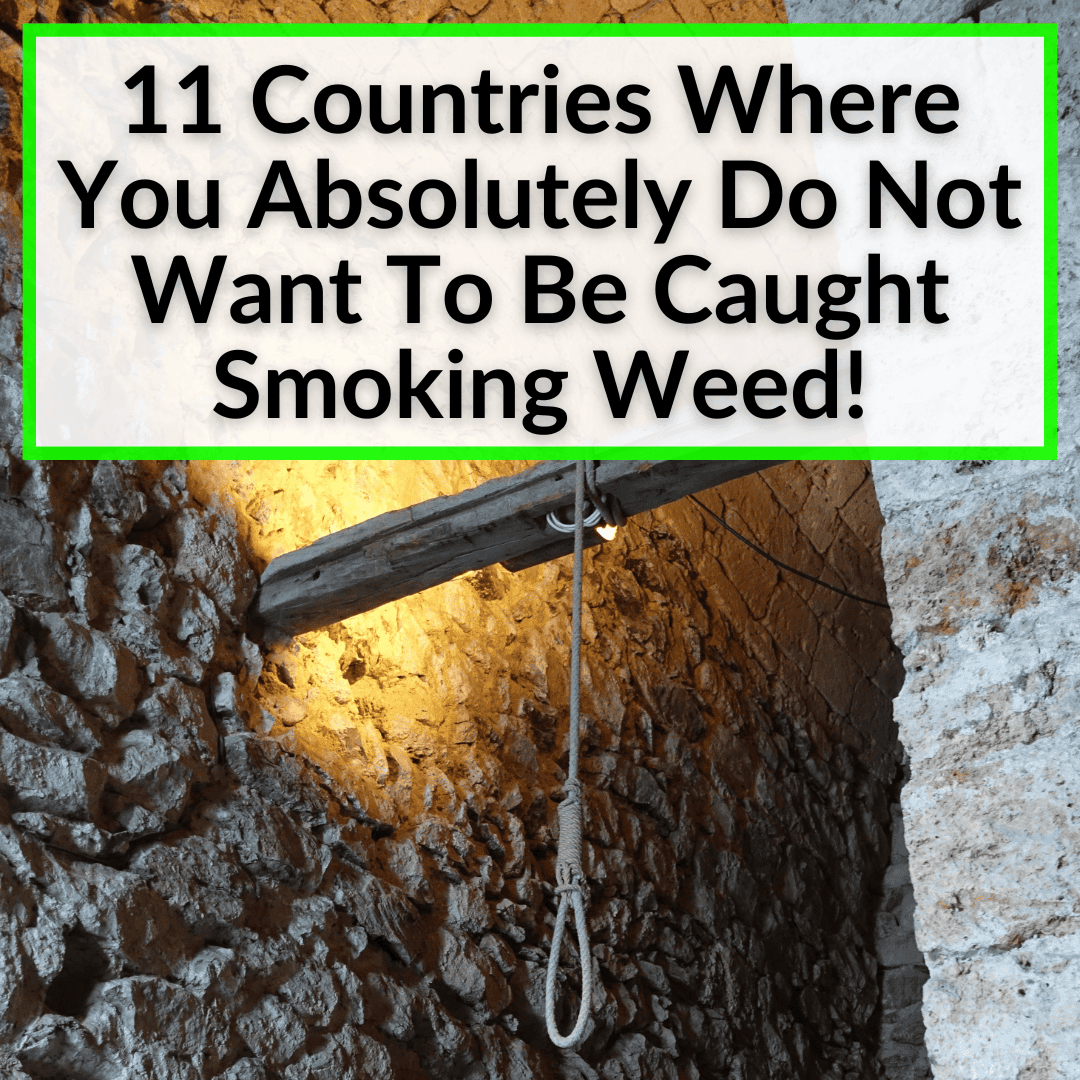 I was always worried I would get caught smoking weed when I was younger.
I was always worried I would get caught smoking weed when I was younger.
I guess my parents’ warnings about ‘ruining my future’ sunk in.
But the truth is, not much would have happened to me had the cops ever caught me smoking.
Certainly nothing close to what citizens of countries where you do not want to be caught smoking weed would face.
While much of the world is becoming more accepting of cannabis use, these countries haven’t budged at all.
Keep reading to learn which parts of the world you will definitely want to avoid, if you enjoy toking up on holidays.
Countries Where You Do Not Want To Be Caught Smoking Weed
All of the following countries have extremely distorted views of the dangers of cannabis and as a result, they have incredibly strict laws governing the herb’s consumption, possession, distribution, and cultivation.
Singapore

Singapore has some of the strictest laws on earth, when it comes to the trafficking, possession, consumption, and import or export of illicit drugs like marijuana.
Since 1975, the country has even mandated the death penalty for people convicted of possession or trafficking drugs. Singapore recently hanged a man (in May 2023) for trafficking less than 3 pounds of cannabis.
Singapore’s Misuse of Drugs Act lists cannabis as a controlled substance. Anyone caught consuming or possessing weed can be sentenced to imprisonment between 1 and 10 years and has to pay a fine of 20,000 SGD, which is a bit under $15,000.
Saudi Arabia

All forms of weed, including CBD, are illegal in Saudi Arabia. If citizens are caught possessing or using weed, they could face imprisonment and whipping.
Foreigners caught with recreational or medicinal marijuana could face prison time between 1 and 6 months, including whippings, monetary fines, and even the death penalty in some cases.
Kuwait

Cannabis, known as dagga in Kuwait, is illegal in all its forms. Kuwaiti drug-related laws are stringent and may result in life imprisonment or even execution.
Citizens caught possessing or using weed could be jailed for up to two years, in addition to paying hefty fines. For foreigners, the rules are even stricter.
Anyone entering the country must abide by its strict drug laws, because Kuwaiti authorities do not let embassies intervene if a tourist is caught with drugs. Take the case of the Indian trucker who tried to smuggle just 3 kilos of cannabis into Kuwait from Iraq.
China

About 150 years ago, there were no drug regulations in China and people rampantly used drugs like weed and opium for recreational purposes. However, authorities believe that this rampant drug use made the people weak.
Not only were they worried about the drugs’ effects on the youth, they felt that drug usage would make the people lose their will to fight. Consequently, the Chinese government decided to ban all forms of drugs.
Article 357 of the Criminal Law of the People’s Republic of China considers weed or marijuana as a narcotic, right next to other ‘heavy drugs’ like heroin, cocaine, etc. Even 50 grams of marijuana could get a foreigner sentenced to death, or at the very least jail time, or hefty fines.
Japan

Japan has always maintained a zero-tolerance policy towards cannabis. It strictly prohibits the possession or sale of the drug. You could be jailed for up to seven years for breaking these laws. The country’s stance on cannabis is among the strictest in the world.
Japanese health ministers have even voiced strong warnings against cannabis-infused products like gummies and edibles, asserting that they pose significant dangers to public health.
In 2023, Japan extended its stringent cannabis laws by banning all products containing HHCH, a semi-synthetic cannabinoid similar to THC.
The strict ban on recreational weed in Japan is so pervasive that many Japanese people might not even be aware of its medicinal benefits. Japan’s rigorous legal framework and cultural compliance highlight its unique and unwavering stance against cannabis use.
Taiwan

Taiwan also has strict laws regarding cannabis, and the government strongly opposes its decriminalization. If you are a foreigner planning to bring medicinal weed into Taiwan, it is advisable to consult with local authorities and follow the country’s laws and regulations.
Sure, there may be weed floating around in the remote parts of Taiwan, but it is certainly something you do not want to get yourself involved in, especially if you value your freedom.
Under Taiwan’s Narcotics Hazard Prevention Act, individuals convicted of using cannabis face a maximum prison sentence of three years. Possession with intent to sell may also incur a minimum sentence of five years in prison and a fine of up to 5 million New Taiwan dollars (which is about $164,000).
Oman

In Oman, both medicinal and recreational cannabis are illegal and banned, despite the country’s role as a transit hub for drugs coming from places like Pakistan and Afghanistan.
The penalties for drug trafficking and possession are severe and may include both- hefty fines and jail time. The authorities do not make any distinction between hard and soft drugs. Both are treated with equal severity under Omani law. Consequently, it is strongly advised to avoid any involvement with drugs in Oman.
Turkey

In Turkey, all forms of cannabis, including medicinal and recreational, are illegal. Individuals caught cultivating, buying, selling, or using cannabis can face imprisonment for 2 to 5 years as per the Turkish Penal Code.
Many tourists wonder if they can bring CBD into Turkey. You can use CBD products for medicinal purposes only, but you need to have a valid prescription for them and the Turkish health authorities must approve the products.
Philippines

In the Philippines, the cultivation, possession, buying/selling, and use of cannabis are illegal under Republic Act 9165, also known as the Comprehensive Dangerous Drugs Act of 2002.
The country has some of the harshest drug laws in the world, including the death penalty for possession of even a small quantity of weed or banned drugs of any kind.
Those caught in possession of the following amounts face penalties of life imprisonment to death and a fine of 500,000 pesos to 10 million pesos: 10 grams or more of resin (hashish) or 500 grams or more of cannabis. And don’t even think about making bubble hash at home.
Brunei

Brunei is known for having some of the strictest laws against cannabis use in the world. It prohibits both recreational and medicinal cannabis. According to Misuse of Drugs 14 CAP. 27, individuals caught with cannabis can face severe penalties.
A person convicted of carrying contraband like weed is liable to a fine not exceeding $10,000, imprisonment for up to 3 years, or both. This harsh legal stance highlights the country’s zero-tolerance policy towards cannabis.
Vietnam

In Vietnam, cannabis is illegal and is classified alongside hard drugs like heroin and cocaine. The country maintains a zero-tolerance policy toward cannabis possession, use, or trafficking.
Penalties for minor possession or small quantities include fines of up to $200. Possession of larger quantities could result in imprisonment for up to 7 years. Large-scale trafficking may result in the death penalty. An exception exists for CBD oil derived from industrial hemp. It is permitted if it contains less than 0.3% THC.
Countries With The Strictest Laws Against Cannabis: Final Thoughts
I’ve been to a few of these countries above and I laid off the weed while I was there for the most part. I did smoke one joint in Japan and, admittedly, a bunch of weed in China. But China did not care about weed back when I was there (they do care now).
I would definitely recommend not smoking if you visit any of these countries, or visiting other countries if you insist on smoking. That said, if you are careful enough, you will probably be fine.
Have you ever visited any of these countries where you absolutely do not want to get caught smoking weed? Did you smoke while you were there, or did you stop smoking until you were back in a more marijuana-friendly nation.
Leave a Reply